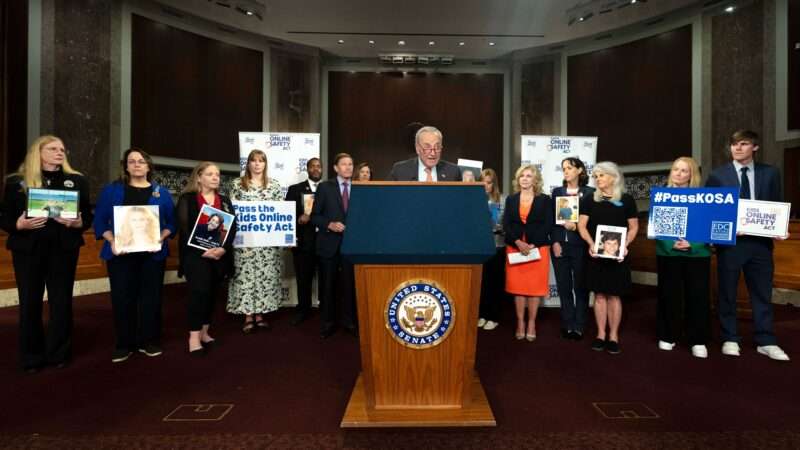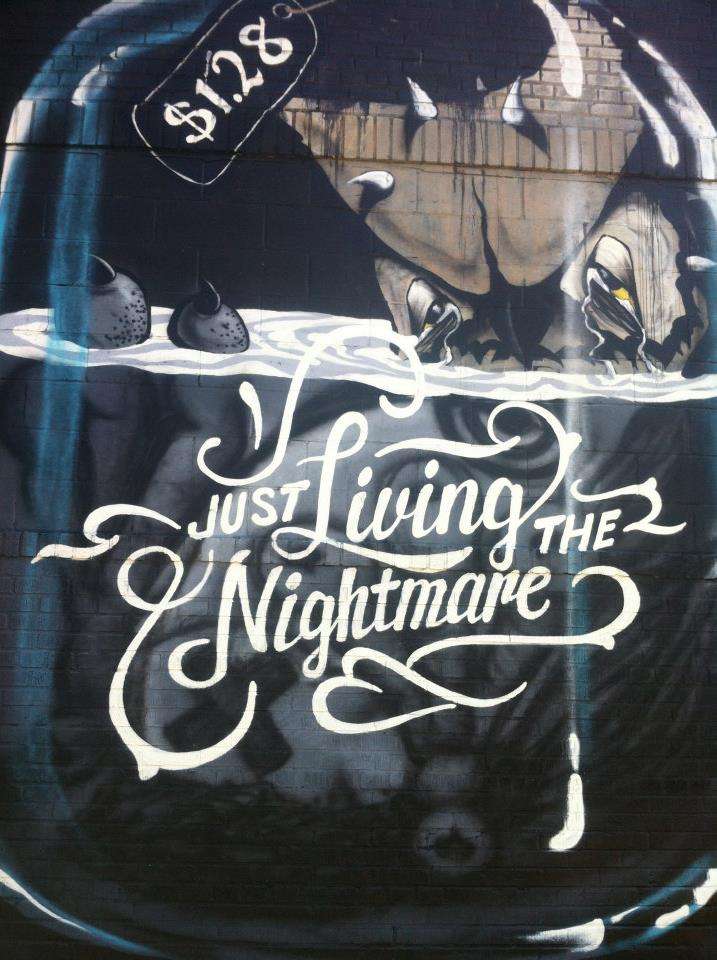
Senate Majority Leader Chuck Schumer (D–N.Y.) will force a vote this week on the Kids Online Safety Act (KOSA), a measure certain to seriously restrict free speech and privacy online for everyone.
The meat of the bipartisan bill is creating a "duty of care" for a huge swath of digital companies (any "online platform, online video game, messaging application, or video streaming service that connects to the internet and that is used, or is reasonably likely to be used, by a minor"). This means they're legally required to protect minors from exposure to anything that could contribute to a host of "harms," including anxiety, depression, eating disorders, suicidal behaviors, being online too much, physical violence, harassment, online bullying, sexual exploitation, sexual abuse, promotion of gambling, alcohol, drugs, or tobacco, and "predatory, unfair, or deceptive marketing practices, or other financial harms."
That's an enormous array of issues, rooted in an even more enormous array of causes. The only way to "prevent and mitigate" services from contributing to these harms is for companies to either drastically censor every user's speech or to block minors from using your service, which means checking IDs for everyone.
Even if used in the most neutral and narrow of ways possible, the potential disruption of free speech and anonymity online is cataclysmic. And I'm highly skeptical that KOSA—which would be enforced by the political appointees at the Federal Trade Commission (FTC)—will wind up being used in the most narrow and neutral of ways.
The potential is great to use KOSA to further specific political agendas—including crusades against abortion, LGBTQ rights, second-amendment rights, sex worker rights, big businesses, language that progressives deem disrespectful, and sexuality broadly.
All of this is likely without even accomplishing the (alleged) goal of keeping kids "safe" online. The KOSA regime will almost certainly block a huge array of helpful and supportive content related to things like mental health, sexuality, and addiction, while also sending kids fleeing to services that are harder to monitor.
But don't take my word for it. Let's look at what people across the political spectrum are saying about KOSA's duty of care plank and its other requirements.
Why People Are Criticizing KOSA
"This internet censorship bill will impact everyone who uses social media," the digital rights group the Electronic Frontier Foundation (EFF) posted on X. "We heard from thousands of young people who don't support KOSA: it will censor the internet but won't help them." (Read the group's interviews with young people here.)
"Paradoxically, what KOSA does is it removes the ability for teens and children to find information when they are experiencing the very sort of health problems and other problems that KOSA is trying to address," EFF lawyer Aaron Mackey told NPR.
KOSA "forces companies to tie parent to child social media accounts and the only way to do that is age and identity verification. Last month, we learned big tech's age/identity verifier left everyone's IDs/SSNs open and accessible for over a year," notes Shoshana Weissmann, digital director and fellow at the R Street Institute.
KOSA "could prevent kids from watching PGA golf or the Super Bowl on social media because of gambling and beer ads," but "those kids could just turn on the TV and see those exact same ads," Sen. Rand Paul (R–Ky.) told TIME magazine.
"This is not about protecting kids. This is about Senators getting to claim they're protecting kids ahead of the election. It makes me sick to my stomach. Experts have repeatedly warned that KOSA would make kids less safe, rather than more safe," said Evan Greer, director of Fight for the Future. "Under a potential Trump administration, the FTC could easily use KOSA to target content related to gender affirming care, abortion, racial justice, climate change, or anything else that Project 2025 infused agency is willing to claim makes kids 'depressed' or 'anxious.'"
"Bills like KOSA cynically hide censorship behind the mantle of child protection. Tell Sen. Schumer and other lawmakers to reject KOSA," urged the Freedom of the Press Foundation.
"KOSA would trigger mandatory uploading of government id's, face scans or social security numbers of parents. In light of recent major security fail from firm that does that, how is this a good solution for parents?" asks Jessica Melugin, director of the Center for Technology and Innovation at the Competitive Enterprise Institute.
"Virtually every time a bill is named 'Keep Kids Safe' or 'Protect Children' or similar, it's the stupidest and slimiest bill you've ever read," New Liberals founder Jeremiah Johnson posted. "KOSA is a disaster. It's unconstitutional…Kill it."
"Tellingly, nothing in the bill sends resources to law enforcement or mental health professionals, so the bill cannot reasonably be interested in shifting safety outcomes for children," writes Patrick Hedger, executive director of the Taxpayers Protection Alliance, in The Washington Times. "Instead, the bill is stuck on an unconstitutional path to bully companies into censoring speech and violating the privacy of every American including children."
KOSA's Fundamental Flaw
There's a lot more to KOSA than just the "duty of care" requirement. But basically, all of it comes down to the same fundamental flaw. At the heart of KOSA—and so many online child "protection" bills—is the pretense that it's possible to eradicate problems associated with young people if only big tech companies would do better.
Online bullying is bad, of course. But bullying in general is bad, and bullying existed long before the internet. So did teens with eating disorders, problematic media habits, mental health issues, and risky or dumb decisions regarding sex and intoxicating substances.
Try as they might, people haven't been able to find more than a correlation between issues like these and the rise of smartphones and social media. And, no, anecdotes don't count, even when those anecdotes are very sad.
It's understandable that parents and politicians want somebody to blame. And it's easy to blame social media, video games, and kids' online interactions with peers. But for every tale of a young person who was bullied or encouraged to engage in undesirable antics online, there are countless teens whose online experiences are a mix of good and bad, and yet others for whom online communities or information can be a lifeline and a way out of bad places.
"Kid would be fine if it weren't for the pesky internet" makes a good political narrative, but it's ridiculously oversimplified to consider complex and intersectional issues.
Substance abuse, eating disorders, suicidal thoughts, etc. are rooted in so much more than what teens see or say online, even if the things they see or say online are most visible and most readily vilified. You simply can't solve these sorts of social, environmental, and medical problems by telling tech companies to "care" more. What you can do, however, is sweep things under the rug—or create a legal scheme that gives the government massive power over the internet broadly.
Today's Image

The post Senate To Vote on Web Censorship Bill Disguised as Kids Safety appeared first on Reason.com.







